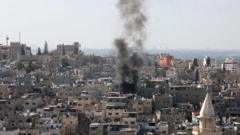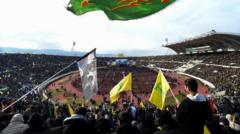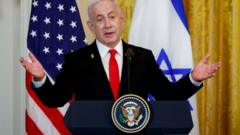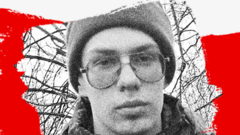### The fragile ceasefire is threatened due to disputes over prisoner exchanges and mutual accusations between Israel and Hamas.
## Rising Tensions Amidst Cease-Fire Disputes Between Israel and Hamas

## Rising Tensions Amidst Cease-Fire Disputes Between Israel and Hamas
### Concerns Mount as Accusations Fly over Hostage Release Agreements
In the ongoing conflict between Israel and Hamas, accusations of cease-fire violations have emerged as both parties grapple with the consequences of a delayed prisoner exchange agreement. Israeli Prime Minister Benjamin Netanyahu's office announced that the release of hundreds of Palestinian prisoners would be postponed until further guarantees regarding the release of hostages could be secured. This decision has heightened tensions, leaving many uncertain about the future of the six-week truce in Gaza, which is set to end soon.
Hamas responded by accusing Israel of undermining the ceasefire, stating that they had committed to releasing hostages without creating humiliating circumstances. The situation has become dire, with mutual accusations creating a climate of distrust. In the recent exchange, Hamas successfully released six Israeli hostages, the last of which were freed in the current phase of the ongoing ceasefire. However, this release was marred by controversy as Hamas also returned the remains of deceased individuals, further complicating the emotional landscape on both sides.
The delay in Israel's release of 620 Palestinian prisoners—an act set to be the most significant release since the truce began—has raised questions about whether there will be a continuation of the ceasefire or if hostilities might resume. Some members of Israel's right-wing government are reportedly advocating for a return to military action, amplifying fears of renewed violence. As this situation unfolds, both Israeli and Hamas officials continue to spar publicly, each side accusing the other of using the hostages for propaganda purposes and exacerbating an already volatile atmosphere.
As the deadline for the ceasefire approaches, uncertainty looms over the prospects for peace. With messages broadcasted from both sides appearing more theatrical than conciliatory, the potential for further conflict is mounting, leaving civilians caught in the crossfire and eagerly awaiting a resolution.
Hamas responded by accusing Israel of undermining the ceasefire, stating that they had committed to releasing hostages without creating humiliating circumstances. The situation has become dire, with mutual accusations creating a climate of distrust. In the recent exchange, Hamas successfully released six Israeli hostages, the last of which were freed in the current phase of the ongoing ceasefire. However, this release was marred by controversy as Hamas also returned the remains of deceased individuals, further complicating the emotional landscape on both sides.
The delay in Israel's release of 620 Palestinian prisoners—an act set to be the most significant release since the truce began—has raised questions about whether there will be a continuation of the ceasefire or if hostilities might resume. Some members of Israel's right-wing government are reportedly advocating for a return to military action, amplifying fears of renewed violence. As this situation unfolds, both Israeli and Hamas officials continue to spar publicly, each side accusing the other of using the hostages for propaganda purposes and exacerbating an already volatile atmosphere.
As the deadline for the ceasefire approaches, uncertainty looms over the prospects for peace. With messages broadcasted from both sides appearing more theatrical than conciliatory, the potential for further conflict is mounting, leaving civilians caught in the crossfire and eagerly awaiting a resolution.


















